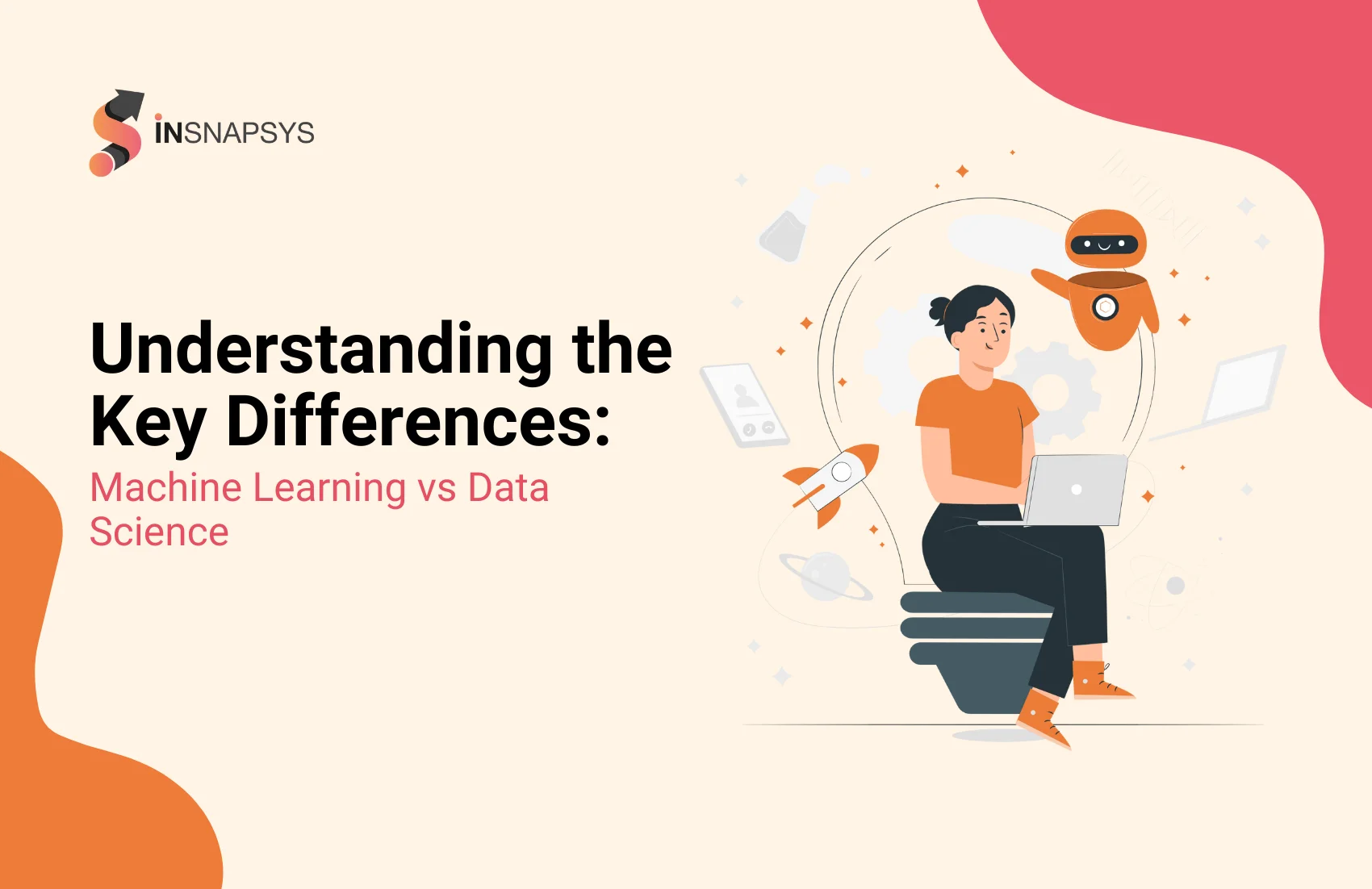In an era where data is the new oil, understanding the nuances between data science and machine learning is crucial for leveraging their potential. The debate on data science vs machine learning often sparks confusion, yet these fields, while interconnected, have distinct roles in the technology landscape.
However, with the right grasp, businesses can leverage the power of both to drive innovation and efficiency.
For instance,
- Consider Netflix, which uses data science to analyze viewer habits and predict trends, while employing machine learning algorithms to recommend personalized content.
- Additionally, Data-driven companies are 19 times more likely to be profitable, 6 times more likely to retain customers, and 23 times more likely to attract new ones, according to McKinsey Global Institute.
- Furthermore, machine learning has been pivotal in advancing technologies like self-driving cars, voice-activated assistants, and more. Thus, proving its transformative impact across various industries.
Overall, the synergy between data science and machine learning can revolutionize how organizations operate. By diving deeper into what sets these fields apart, we can appreciate their individual strengths and how they complement each other. Let’s get into the debate of data science vs machine learning.
What is Data Science?
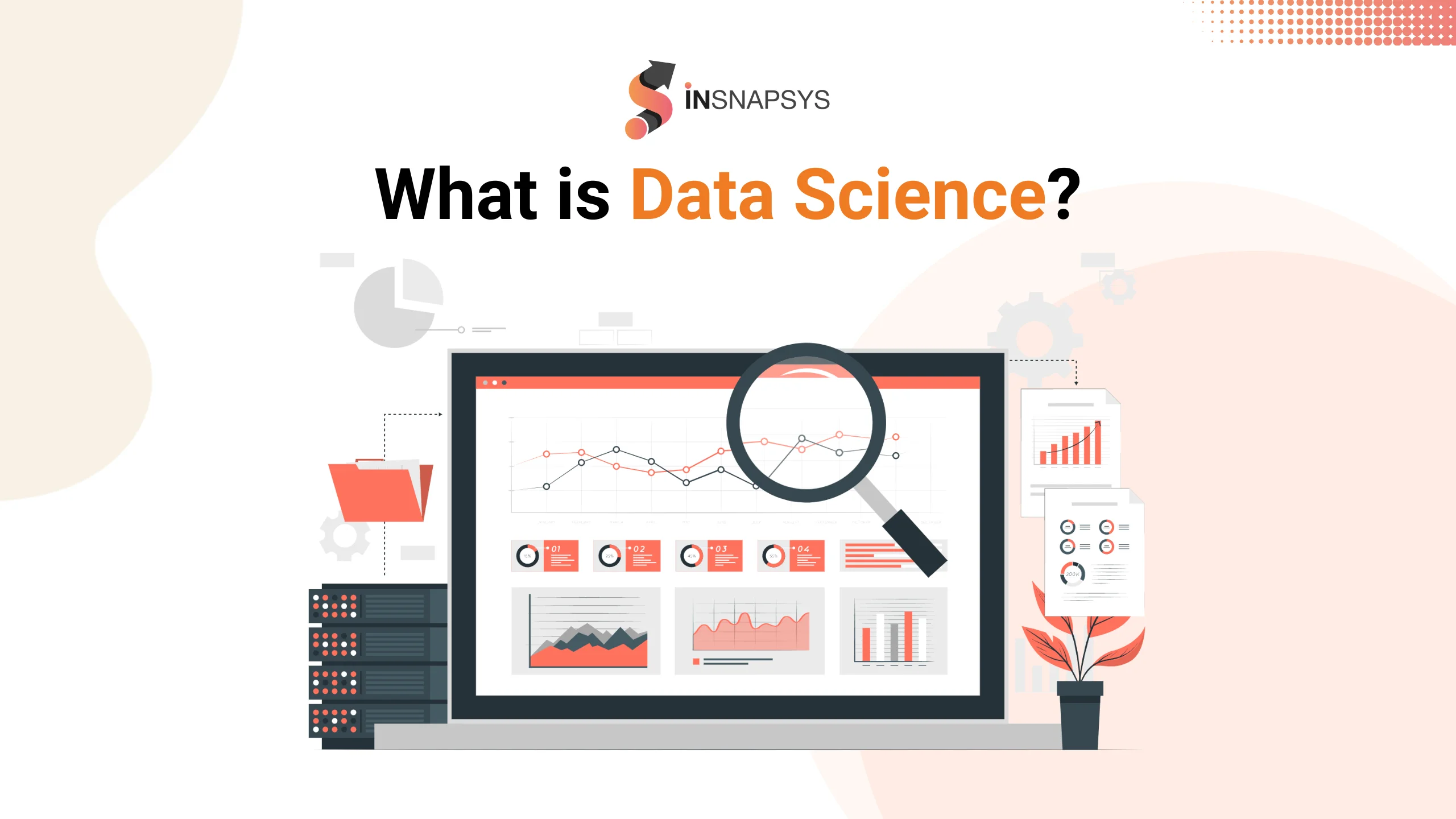
Data science is an interdisciplinary field that focuses on extracting insights and knowledge from structured and unstructured data. It combines techniques from:
- Statistics,
- Computer science, and
- Domain expertise to analyze and interpret complex datasets.
Moreover, data scientists use a variety of tools and methodologies, such as data mining, predictive modeling, and machine learning, to uncover patterns, make predictions, and inform decision-making processes.
Furthermore, the goal of data science is to transform raw data into actionable insights that can drive strategic business decisions and innovations.
What is Machine Learning?
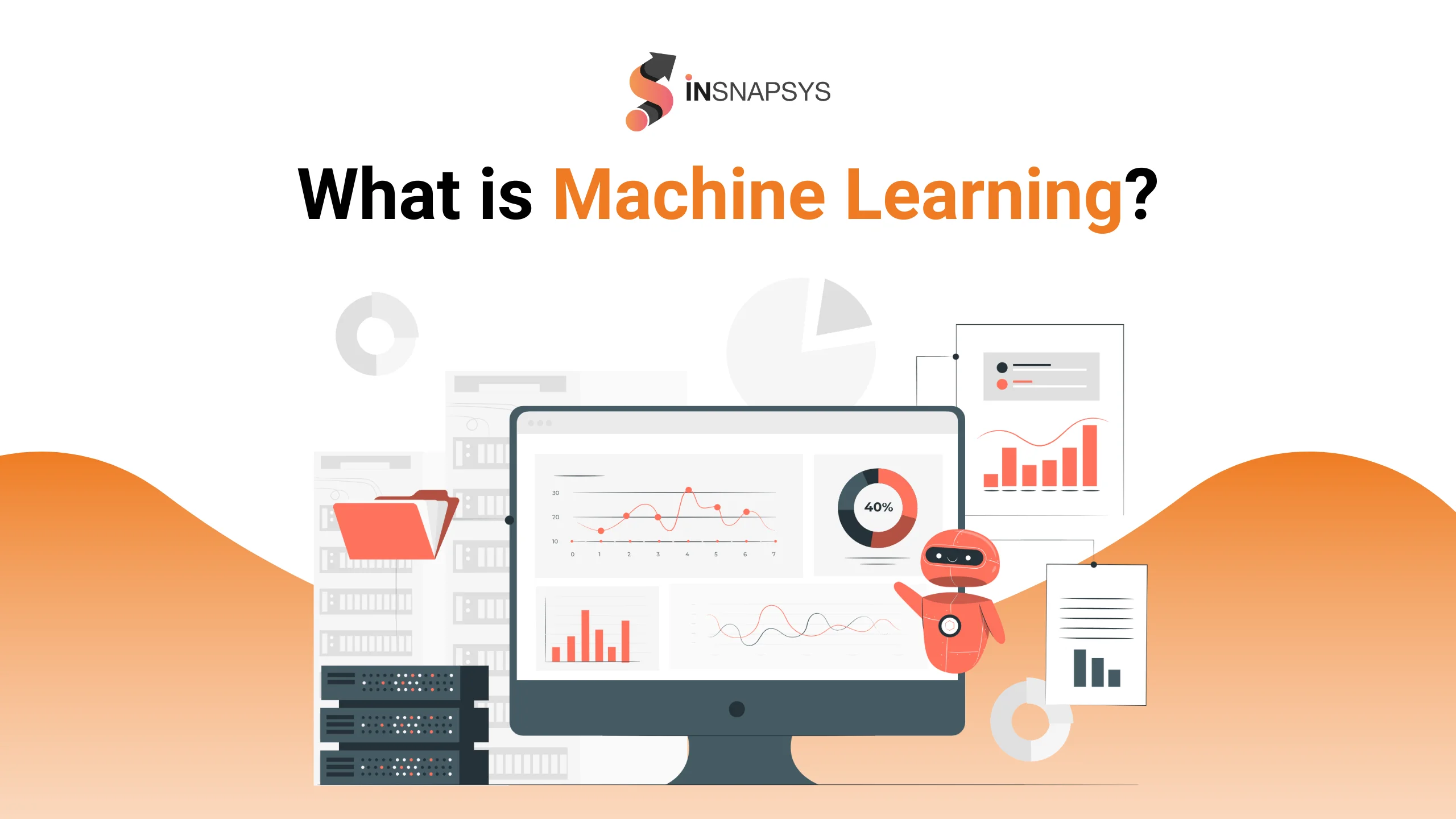
Machine learning is a subset of artificial intelligence that enables systems to learn and improve from experience without being explicitly programmed. It involves the development of algorithms that can identify patterns within data, make predictions, and adapt over time.
Furthermore, these algorithms are trained on large datasets and use statistical techniques to optimize their performance. Machine learning applications are widespread, ranging from image and speech recognition to fraud detection and recommendation systems.
Moreover, the core idea of machine learning is to build models that can generalize from past data to new, unseen data, providing valuable insights and automation capabilities.
Difference Between Data Science and Machine Learning
While data science and machine learning are closely related, they serve distinct purposes and involve different processes. Here is a comparative table highlighting data science vs machine learning:
| Aspect | Data Science | Machine Learning |
| Definition | Interdisciplinary field focused on extracting insights from data. | Subset of AI that involves algorithms learning from data to make predictions. |
| Scope | Broader, encompassing data analysis, data engineering, and statistical modeling. | More focused, specifically on creating models that learn from and make predictions based on data. |
| Primary Goal | To derive actionable insights and inform decision-making. | To develop algorithms that can learn from data and make accurate predictions or decisions. |
| Techniques Used | Statistics, data mining, data visualization, predictive analytics. | Supervised learning, unsupervised learning, and reinforcement learning. |
| Tools | Python, R, SQL, Hadoop, Tableau. | TensorFlow, PyTorch, Scikit-Learn, Keras. |
| Data Types | Structured, unstructured, and semi-structured data. | Primarily structured data for model training. |
| Process | Involves data collection, cleaning, analysis, and visualization. | Involves training models, validating them, and optimizing their performance. |
| Outcome | Insights, reports, and data-driven strategies. | Predictive models, automated systems, actionable predictions. |
| Example Applications | Business intelligence, market analysis, fraud detection. | Image recognition, natural language processing, and recommendation systems. |
Understanding these differences in data science vs machine learning helps choose the right approach and tools for specific tasks. As a result, this ensures that the strengths of both data science and machine learning are effectively utilized.
How Data Science Evolved
In order to better understand data science vs machine learning, we need to understand the history of both. The evolution of data science is rooted in the increasing availability of data and advancements in technology.
Additionally, the introduction of big data in the early 2000s marked a significant turning point. This period saw the rise of technologies like Hadoop and NoSQL databases, which enabled the processing and analysis of large-scale data.
Today, data science is a dynamic field that integrates various disciplines such as computer science, statistics, and domain-specific knowledge. It leverages modern tools and techniques to extract meaningful insights from complex datasets, driving innovation across industries.
Challenges of Data Science
If data science is that good, why do we have a debate over data science vs machine learning? You guessed it right.
Despite its advancements, data science faces several challenges:
- Data Quality and Management: Firstly, certifying the accuracy, consistency, and completeness of data is a major challenge. Moreover, poor data quality can lead to incorrect insights and decisions.
- Data Privacy and Security: Handling sensitive data requires stringent security measures to protect against breaches and ensure compliance with regulations like GDPR.
- Scalability: Managing and analyzing large volumes of data efficiently requires scalable infrastructure and optimized algorithms.
- Integration of Diverse Data Sources: Lastly, combining data from different sources with varying formats and structures can be complex and time-consuming.
Data Science Use Cases
Data science is applied across various sectors to solve complex problems and improve decision-making. Here are some notable use cases:
- Healthcare: Data science is used for predictive analytics in patient care, identifying disease outbreaks, and optimizing treatment plans. For example, predictive models can forecast patient admission rates. Therefore, helping hospitals manage resources more effectively.
- Finance: Financial institutions leverage data science for fraud detection, risk management, and algorithmic trading. Anomaly detection algorithms can identify fraudulent transactions in real-time. Thus, minimizing losses.
- Retail: Retailers use data science for customer segmentation, demand forecasting, and personalized marketing. Additionally, analyzing customer purchase history helps in creating targeted marketing campaigns that enhance customer engagement.
- Manufacturing: Predictive maintenance powered by data science can reduce downtime and maintenance costs. Sensors on machinery collect data that predictive models use to anticipate failures before they occur.
How Machine Learning is Evolving
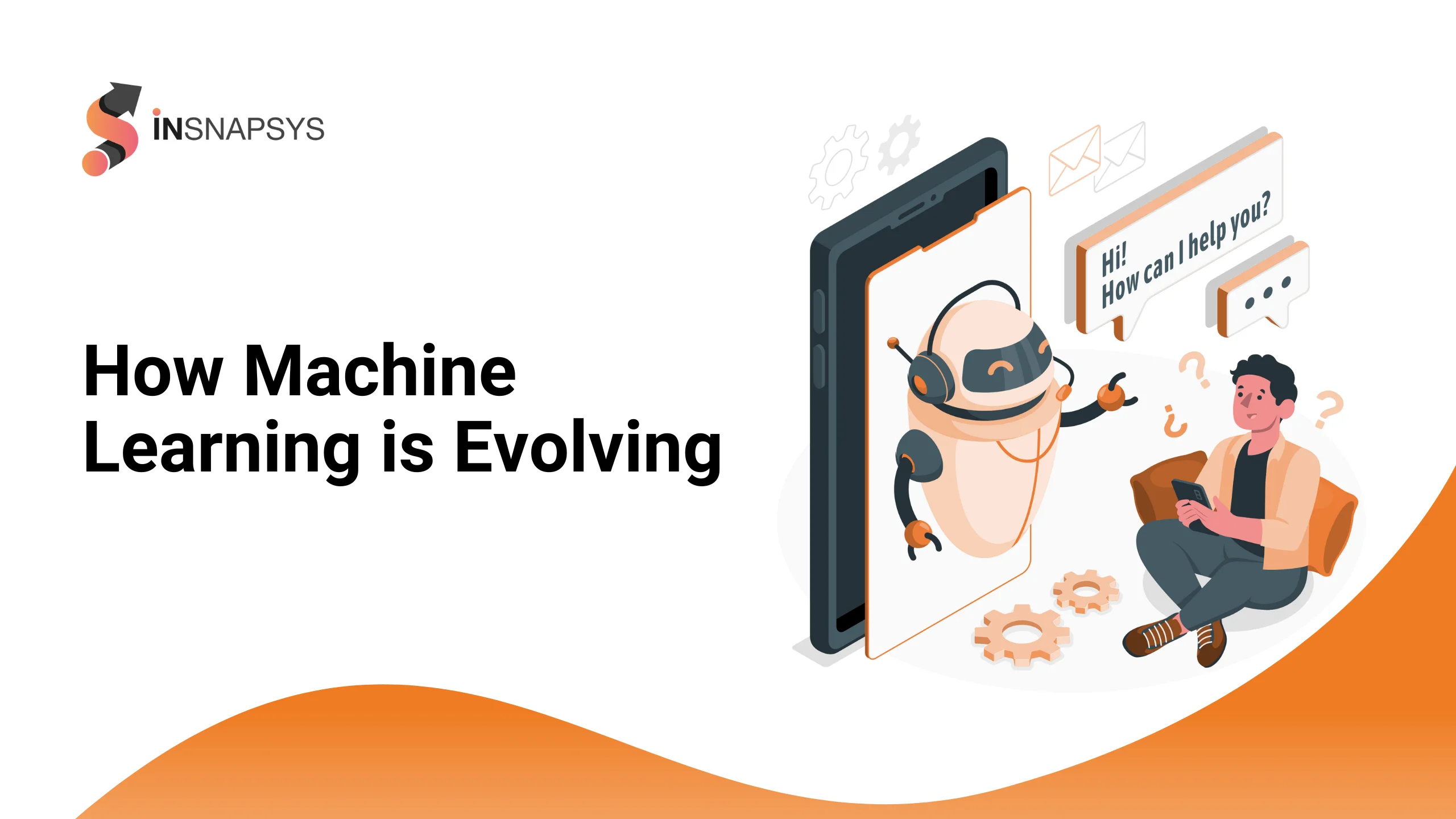
Machine learning has seen rapid evolution driven by:
- Advances in computing power,
- The availability of large datasets, and
- Improvements in algorithms.
The advent of big data has also played a crucial role in the evolution of machine learning. With vast amounts of data available from various sources, machine learning models can be trained more effectively. As a result, it leads to higher accuracy and better performance.
Additionally, advancements in hardware, such as GPUs and TPUs, have significantly reduced the time required to train complex models, making it feasible to deploy machine learning at scale.
Challenges of Machine Learning
Despite its rapid evolution, machine learning faces several challenges:
- Data Quality and Quantity: Firstly, high-quality, labeled data is essential for training accurate models. However, obtaining and curating such data can be difficult and expensive.
- Model Interpretability: Many machine learning models, especially deep learning models, are often considered black boxes. Therefore, understanding and explaining their decisions can be challenging, hindering trust and adoption.
- Scalability: Training and deploying machine learning models on large datasets require significant computational resources, which can be costly and time-consuming.
- Security: Lastly, machine learning systems are vulnerable to adversarial attacks, a threat to cybersecurity, where malicious inputs are designed to deceive the model. Thus, causing it to make incorrect predictions.
Machine Learning Use Cases
The best way to compare data science vs machine learning is to look at their use cases. While both of them have applications in the same industries, their use cases are different. Here are the use cases of Machine learning.
- Healthcare: Machine learning for healthcare is used for disease diagnosis, personalized treatment plans, and drug discovery. For example, ML algorithms can analyze medical images to detect conditions like cancer at an early stage.
- Finance: Machine learning in finance is a game changer. ML models are employed for fraud detection, algorithmic trading, and credit scoring. Moreover, predictive analytics help financial institutions identify fraudulent activities in real-time and mitigate risks.
- Retail: Furthermore, personalized recommendations, inventory management, and demand forecasting are some of the ways machine learning enhances the retail sector.
- Manufacturing: Predictive maintenance powered by machine learning reduces downtime and operational costs. Therefore, by analyzing data from sensors, ML models can predict equipment failures before they occur.
How Insnapsys Can Help You with Your Data Science and ML Needs
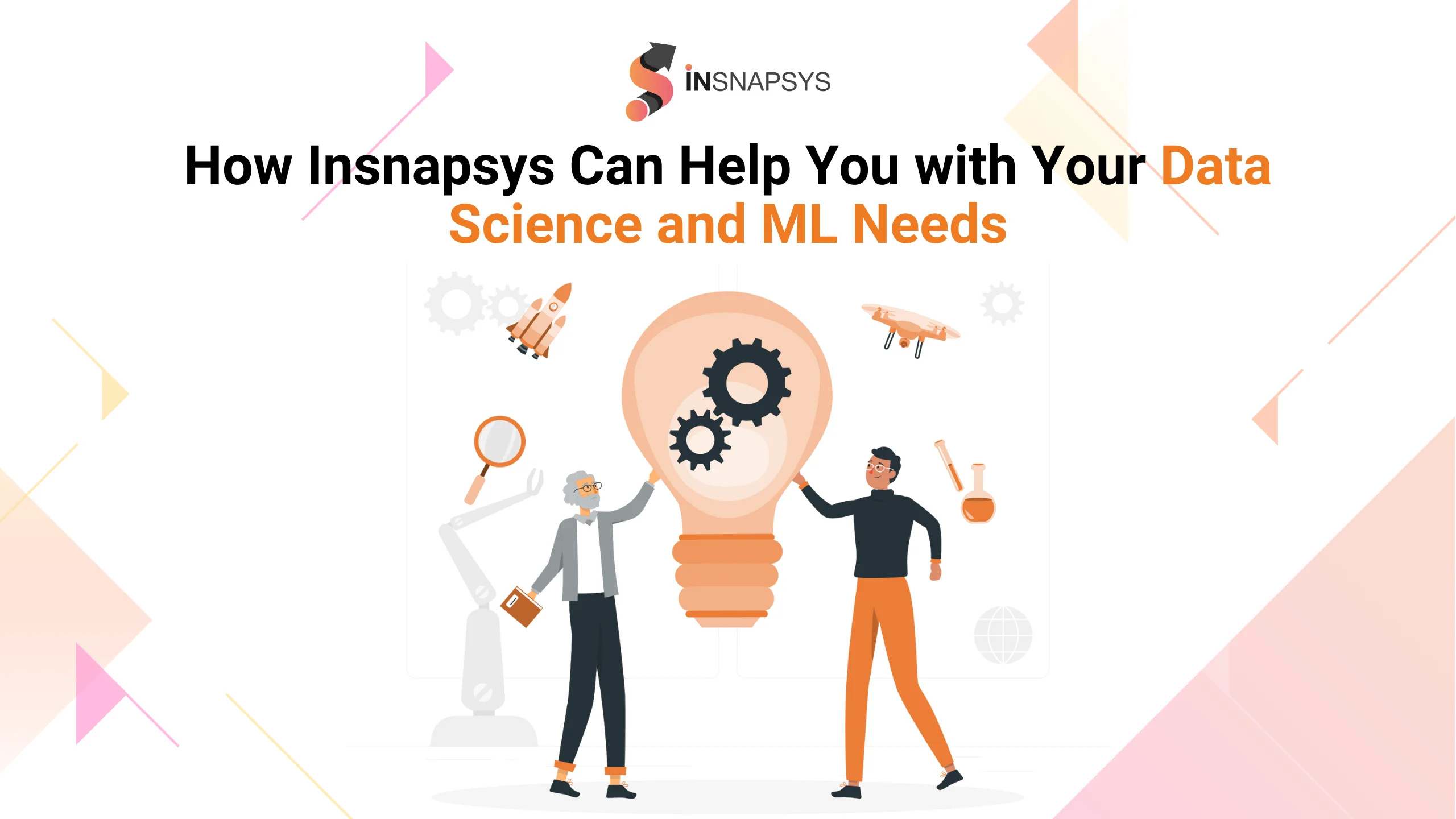
Insnapsys is an IT staffing company dedicated to providing talented developers for your IT projects, including data science and machine learning initiatives.
By partnering with Insnapsys, you gain access to a pool of skilled professionals who specialize in extracting actionable insights from data and developing advanced machine-learning models.
You can hire these experts to help your business leverage the full potential of data science and machine learning. This includes analyzing complex datasets to implementing predictive algorithms that drive innovation and efficiency.
Therefore, with Insnapsys, you can scale your data science and machine learning teams quickly. Thus, ensuring that you have the right talent to tackle any challenge.
Whether you’re looking to enhance decision-making processes, automate tasks, or gain a competitive edge through data-driven strategies, Insnapsys provides the expertise to help you achieve your goals. Here is how Insnapsys helps you in onboarding developers.
Conclusion:
In summary, understanding the differences between data science vs machine learning is essential for leveraging their unique strengths. Data science encompasses a broader scope, focusing on extracting insights from data and informing strategic decisions.
On the other hand, machine learning specializes in developing algorithms that learn from data to make predictions. Both fields, despite their challenges, offer transformative potential across various industries.
Therefore, by recognizing the distinct roles of data science vs machine learning, businesses can make more informed decisions and drive technological innovation to new heights.
FAQs
-
What are the cost implications of implementing data science vs machine learning in a business?
The cost implications of implementing data science vs machine learning vary depending on the scope and scale of the project. Both fields also require skilled professionals, which can be a significant part of the investment. Therefore, it is better to contact Insnapsys for your project needs.
-
Which industries benefit the most from data science vs machine learning?
Industries such as finance, healthcare, retail, manufacturing, and transportation benefit significantly from both data science and machine learning.
-
What are the real-world applications of data science vs machine learning in healthcare?
In healthcare, data science is used to analyze patient data and improve hospital management. Machine learning, on the other hand, is employed for diagnostic purposes, such as identifying diseases from medical images and predicting patient outcomes.
-
What are the risks of not adopting data science vs machine learning for a business?
Not adopting data science vs machine learning can put businesses at a competitive disadvantage. Without them, businesses may miss out on valuable insights from their data and may struggle to keep up with automation trends.
-
How do data science and machine learning complement each other?
Both ml data science complement each other by combining data analysis with predictive modeling. As a result, this synergy allows organizations to extract valuable insights and automate complex processes. Thus, making the most of data science vs machine learning.






